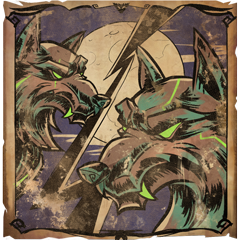Wolfsbane: Difference between revisions
DansFriend (talk | contribs) No edit summary |
m (Bot: Automated text replacement (-*A similar +A similar)) |
||
| Line 23: | Line 23: | ||
Wolfsbane is a given name for poisonous flowering plants: ''{{W|Aconitum}}'' and ''{{W|Arnica montana}}''. | Wolfsbane is a given name for poisonous flowering plants: ''{{W|Aconitum}}'' and ''{{W|Arnica montana}}''. | ||
==Trivia== | ==Trivia== | ||
A similar trophy appears in the 2023 port of ''[[MediEvil: Resurrection]]'': | |||
{{TrophyTableBegin}} | {{TrophyTableBegin}} | ||
{{Trophy/Resurrection|Leaders of the Pack}} | {{Trophy/Resurrection|Leaders of the Pack}} | ||
Revision as of 17:51, 14 April 2024
|
| Wolfsbane | |||
|---|---|---|---|
 | |||
| Description | Defeat the Guardians of the Graveyard. | ||
| Trophy type | |||
| Hidden | Yes | ||
| Prior trophy | King of Cups | ||
| Next trophy | A Paneful Demise | ||
Wolfsbane is a story-related trophy in the MediEvil remake.
How to unlock
Defeat the Guardians of the Graveyard in the Return to the Graveyard level.
Behind the scenes
Reuse
The trophy was reused for a trophy in the PlayStation Plus re-release of the original MediEvil:
Defeat the Guardians of the Graveyard. |
Trophy name
Wolfsbane is a given name for poisonous flowering plants: Aconitum and Arnica montana.
Trivia
A similar trophy appears in the 2023 port of MediEvil: Resurrection:
Defeat the Stone Wolves. |
In other languages
The trophy names were left untranslated in six of the thirty PlayStation Network languages: Chinese (Simplified), Chinese (Traditional), Indonesian, Korean, Thai, and Vietnamese.
| Language | Name |
|---|---|
| Arabic | خانق الذئاب khaniq aldhiyaab |
| Czech | Vlčí mor |
| Danish | Ulvefælder |
| Dutch | Wolvendoder |
| Finnish | Sudenhukka |
| French (Canada) | Tue-loup |
| French (France) | Tue-loup |
| German | Wolfsbann |
| Greek | Λυκοκτόνος Lykoktónos |
| Hungarian | Farkasvadász |
| Italian | Terrore dei lupi |
| Japanese | オオカミを倒せし者 Ōkami o taoseshi mono |
| Norwegian | Ulvebane |
| Polish | Postrach wilków |
| Portuguese (Brazil) | Mata-Lobos |
| Portuguese (Portugal) | Antilobo |
| Romanian | Năpasta Lupilor |
| Russian | Гроза волков Groza volkov |
| Spanish (LatAm) | Matalobos |
| Spanish (Spain) | Matalobos |
| Swedish | Vargarnas Bane |
| Turkish | Kurtboğan |